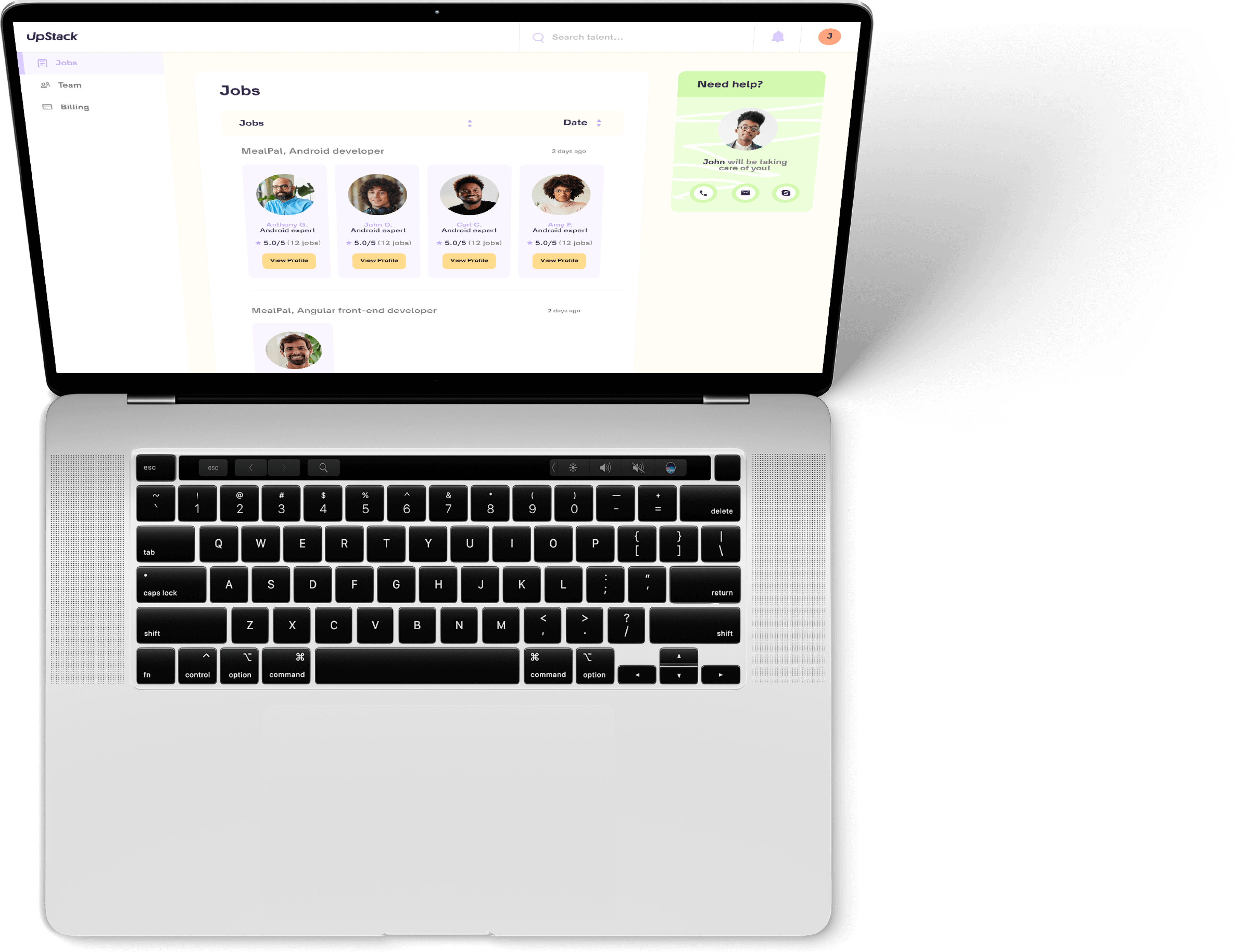


Schedule a Consultation and Hire a Drupal Developer
Stella B.
Available
Drupal Developer
-
Experienced Drupal engineer with seamless project implementation
-
Loves guacamole & hates spoilers

-
Marcus T.
Available
Drupal Engineer
-
Stacked portfolio of beautiful, functional websites
-
Known for his epic charcuterie & cheese boards

-
David M.
Available
Mobile Developer
-
Mobile engineering guru with a knack for translating stakeholder needs
-
Would rather be diving Palau’s Blue Corner

-
Top Drupal Developers with Upstack
Hire Drupal Developers with Upstack
If you need to hire a Drupal developer for a website or application, it can be difficult to know where to begin. With so many developers out there, it can be hard to determine which one is the best fit for the job. Fortunately, there are several tips you can use to help you find the right Drupal developer. By following these tips, you can be sure you’re hiring the right person for your project, ensuring successful completion and satisfaction. From considering their experience to making sure they understand your project requirements, these tips will help you make the right decision.
Consider each candidate’s experience
Experience matters when it comes to hiring a Drupal programmer. You may want to select a person who has been working with Drupal for years, or you may be willing to hire someone who has recently completed a Drupal project. Whichever you prefer, experience is important when it comes to hiring a developer. It also allows you to know what you can expect from a given developer on your project. If you feel hiring someone with a lot of experience is too costly for your project, you can also consider hiring someone who has just completed a Drupal project. It may be difficult to determine how long that person has been working with Drupal. However, it may be worthwhile to hire someone who has recently completed a Drupal project and will work for a lower price.
Look for evidence of past projects
Another thing you may want to consider when hiring a Drupal developer is evidence of past projects. This can help you see the type of work a developer has worked on in the past. It can also help you better understand the types of projects a developer has worked on. This can be helpful in a number of ways. First, it can help you determine if the developer has the experience required for your project. It can also help you get an idea of the type of quality you can expect from the developer. It can also help you determine if a developer has experience in the type of project requirements you have. When hiring a developer, you may find some have a portfolio of work. In other cases, you may find they have an online presence. This can help you see their work and determine if they’re a good fit for your project.
Ensure they understand your project requirements
As you interview candidates, you may want to ensure they understand your project requirements. This can help you better determine if they’re the right fit for your project. It can also help you get an idea of how much they really understand your project requirements. You may want to ask them some questions related to your project requirements. This can help you better understand how well they understand your project requirements. It can also help you get an idea of their experience related to your project requirements. This can help you better determine if they’re the right fit for your project. It can also help you avoid hiring someone who doesn’t understand your project requirements. This can save time, money, and frustration on your end.
Request references
Another thing you may want to do when hiring a Drupal programmer is request references. This can help you get an idea of how others have worked with the developer in the past. It can also help you get an idea of how well a developer communicates with clients in general. If you don’t already have references, this can help you determine if the developer is a good fit for your project. It can also help you get an idea of how quickly a developer can work on your project. You may want to consider requesting references from clients they have worked with in the past. You may also want to consider asking for references from other people they’ve worked with, such as colleagues.
Ask the right questions during the interview
As you interview each candidate, you may want to ask the right questions. This can help you better understand each candidate’s experience. It can also help you get an idea of how well each candidate understands your project requirements. It can also help you get an idea of how quickly each candidate can complete your project. You may want to ask a combination of questions related to their experience and your project requirements. This can help you get a better idea of each candidate’s experience and how well they understand your project requirements. It can also help you get an idea of how quickly each candidate can complete your project.
Check for certifications
You may want to check for certifications when hiring a Drupal developer. This can help you better determine if a candidate has the necessary skills for your project. It can also help you get an idea of how much they know about Drupal and website development in general. This can help you better determine if a candidate is a good fit for your project. It can also help you get an idea of how quickly they can complete your project. Some types of certifications may require a significant amount of experience. Others may require less experience, although they can still be very valuable.
Establish communication expectations
Communication expectations are important to discuss when hiring a Drupal developer. You may want to discuss how often you’d like to communicate with the developer. You may also want to discuss what communication mediums you’d like to use. This can help you better determine if a candidate is a good fit for your project. It can also help you get an idea of how efficient and effective communication will be with this developer. This can help you better determine if a candidate is a good fit for your project. It can also help you get an idea of how quickly you can complete your project.
Consider their rates
Rates may vary depending on the type of project you’re working on. They can also vary depending on the experience of the developer you hire. You may want to consider rates when hiring a Drupal developer. This can help you better determine if the developer is a good fit for your project. It can also help you get an idea of how quickly they can complete your project. This can help you better determine if a developer is a good fit for your project. It can also help you get an idea of how quickly you can complete your project.
Outline the contract and timeline
You may also want to outline a contract and timeline for the project. This can help you better determine if a candidate is a good fit for your project. It can also help you get an idea of how quickly they can complete your project. This can help you better determine if a candidate is a good fit for your project. It can also help you get an idea of how quickly you can complete your project. It can also help you better determine if a candidate is a good fit for your project.
Make sure you have the right resources
Finally, make sure you have the right resources for the project. This can help you better determine if a candidate is a good fit for your project. It can also help you get an idea of how quickly they can complete your project. It can help you better determine if a candidate is a good fit for your project. It can also help you get an idea of how quickly you can complete your project. Additionally, it can help you find a developer who is a good fit for your project. It can also help you get an idea of how quickly they can complete your project.
They trust Our Drupal Developers
Why hire a Drupal developer with Upstack
![Drupal Developer and Programmer]()
Top Drupal talent pre-vetted for a perfect fit.
Our 8-point assessment evaluation ensures that every senior Drupal developer you interview exceeds expectations across technical, cultural, and language criteria.
![Drupal Programmers Computer Icon]()
Hire reliable, passionate Drupal developers.
From late-night sprints to jumping on a last-minute face-to-face, we ensure that your recruits are down to get the job done right.
![Drupal Programmers High Five Icon]()
Risk-free 14-day trial.
Confidently onboard candidates with our no-questions-asked trial period. We’ll walk you through the contract-to-hire process if and when you’re ready to make it permanent with your new Drupal engineer.
![Drupal Computer Programmer Icon]()
Our Client Success Experts provide white-glove service.
Stay laser-focused on your business goals while our team of experts curates potential candidates and manages seamless programmer onboarding.
![Drupal Developer Writing Notes Icon]()
Build your optimal team confidently, quickly.
UpStack handles everything including background and reference checks, legal issues, and more. Our platform streamlines billing, timesheets, and payment all in one easy-to-access place.
Schedule a call with a Client Success Expert to get starting hiring a Drupal developer.
Start hiring Start hiring Start hiring
Hire from the Best.
Working with our Client Success Experts, we’ll help you build the remote team of your dreams with top Drupal talent from around the world.
Pre-vetted, reliable Drupal developers are standing by.





Hiring Drupal Developers | FAQs
How much does it cost to hire a Drupal developer?
UpStack has a simple billing model where each Drupal developer has a standard hourly rate averaging between $65-$75 per hour. Rates are based on skills, knowledge, and experience, and our developers are available mainly for full-time engagement (40 hours per week) and the occasional part-time opportunity (20 hours per week).
What is the process to find a Drupal developer?
You’ll connect with an UpStack Client Success Manager to determine your immediate needs. Our team uses a combination of AI and personal assessment to short-list candidates that match your job requirements. From there, you interview, select, and onboard the perfect developer, all within days of your initial call.
How does UpStack find its Drupal developers?
UpStack’s talent recruitment team connects with software developers around the globe every day. Each Drupal programmer is vetted for technical, communication, and other soft skills necessary for a developer to successfully work with your team. Once vetted, the candidates are accepted into the UpStack developer community.
How is UpStack different from an agency or recruiter?
UpStack's community of available, pre-vetted engineering talent means minimizing roadblocks to scaling your team effectively, efficiently, and immediately. Our Client Success Experts work with you and your UpStack developer to ensure a smooth and seamless engagement.
Can I hire UpStack Drupal developers directly?
Yes, you can hire UpStack Drupal developers at any time, and with the same assurance of smoothly on boarding talent risk-free. First, we’d create a job opening on our portal. Then, we’d vet, interview, and match developers that meet your needs. If you’re satisfied at the end of the 14-day trial period, at any time you can directly hire them.
Common Drupal Programming Questions
What is Drupal?
Drupal is a content management system (CMS) that is used to create and manage websites. It is an open-source platform, which means that the source code is freely available and can be modified and customized by anyone. Drupal is written in the PHP programming language and uses a database to store its data. It is known for its flexibility and scalability, and is used by a wide range of organizations, including governments, educational institutions, and businesses. Drupal provides a user-friendly interface for creating and managing content, and offers a variety of features and modules that can be used to extend its functionality.
What are some common Drupal problems?
Drupal is a powerful content management system, but like any software, it can sometimes experience problems. Some common Drupal problems include:
- Security vulnerabilities: Because Drupal is a popular platform, it is often targeted by hackers. To protect your site, it is important to keep Drupal and all of your modules and themes up to date with the latest security patches.
- Performance issues: As your site grows and attracts more traffic, it can start to slow down. This can be caused by a variety of factors, including inefficient custom code, a large number of modules, and inadequate hosting.
- Compatibility issues: If you are using a custom module or theme that is not compatible with the version of Drupal you are running, it can cause problems with your site. To avoid compatibility issues, it is important to test your custom code before installing it on your live site.
- Difficulty managing content: If you have a large amount of content on your site, it can be difficult to keep it organized and easily accessible. To help with this, Drupal provides a variety of tools for managing content, such as taxonomies, content types, and views.
- Difficulty customizing the site: Drupal can be highly customizable, but if you are not familiar with its theming and module development system, it can be difficult to make changes to your site. To make customizations easier, you can use tools like the Drupal Bootstrap base theme, which provides a good starting point for customizing the look and feel of your site.
- Difficulty migrating to a new version: When a new version of Drupal is released, you may want to upgrade your site to take advantage of new features and security updates. However, migrating to a new version of Drupal can be difficult, especially if you have a lot of custom code and data on your site. To make the process easier, you can use tools like the Drupal Upgrade module, which can help you migrate your site to the latest version of Drupal.
Why is Drupal so popular?
Drupal is a popular content management system (CMS) because it is user-friendly and offers a wide range of features and functionalities. Some of its key features include easy content creation and publishing, reliable performance, and good security. Drupal is also highly customizable, allowing users to tailor it to their specific needs and requirements. Additionally, it has a large and active community of users and developers who contribute modules, themes, and support to the platform.
What framework is Drupal built on?
Drupal is built on its own PHP-based web application framework. This framework provides the core structure and functionality for Drupal, and enables developers to extend and customize the platform for specific needs and requirements. The Drupal framework is designed to be modular, so developers can easily add or remove components as needed to create custom applications and websites.
How do I install module in Drupal?
To install a module in Drupal, follow these steps:
- Download the module from the Drupal website or from a trusted source.
- Extract the module and place it in the "modules" directory within your Drupal installation.
- In your Drupal administration interface, go to the "Extend" menu.
- Scroll down to the module you want to install, and click the "Install" button next to it.
- Once the installation is complete, click the "Enable newly added modules" button at the bottom of the page.
- The module is now installed and enabled on your Drupal website. You can access and configure it from the "Extend" menu in the Drupal administration interface.
Note: Some modules may require additional steps or dependencies to be installed before they can be used. Consult the module's documentation for more information.
Is Drupal better than Wordpress?
Whether Drupal or WordPress is "better" depends on your specific needs and requirements. Both Drupal and WordPress are popular content management systems (CMS) with their own strengths and weaknesses.
Drupal is generally considered to be more powerful and flexible than WordPress, with a larger range of features and functionalities. It is also more customizable, allowing developers to create custom applications and websites. However, Drupal can be more complex and challenging to use, especially for non-technical users.
WordPress, on the other hand, is known for its user-friendly interface and ease of use. It is a good choice for bloggers and small businesses that need a simple website. However, it may not have the same level of flexibility and customization as Drupal.
Ultimately, the best choice between Drupal and WordPress depends on your specific needs and goals. It may be helpful to try both platforms and see which one works better for you.















